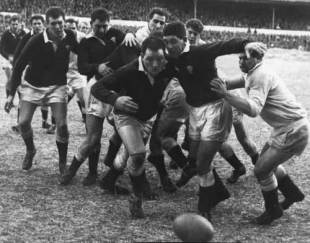|
Wales 6-13 England, January 19, 1963
'A triumph of mind over matter'
Richard Seeckts
January 19, 1963

Wales' Norman Gale holds off England's John Thorne as Denzil Williams goes for the ball
© Getty Images Enlarge
When England beat Wales in Cardiff in 1991 for the first time in 28 years, the length of the hiatus was the talking point. Relatively few remembered that England's previous win, in 1963, took place on a pitch frozen solid in conditions that would see any game called off in the modern era. Britain was in the grip of its coldest winter since 1740, according to the Met Office. Outdoor sport had more or less been wiped out by the weather for five weeks, but the Cardiff authorities were determined to put on a show for both spectators in the ground and for millions of television viewers who, with little else to do in such conditions, watched the match. 30 tonnes of straw were removed from the pitch on the morning of the match, the dead ball areas were shortened to six yards due to frozen patches and the white paint for marking the lines froze during pitch preparations. At kick-off the temperature was minus six degrees. Both teams remained indoors to keep warm while the National Anthems were played; the match started immediately they took the field. "No prophecy of the outcome is attempted", offered The Times correspondent. Wise counsel given that, in addition to the long lay-off, neither side had managed any meaningful practice and 13 players were making their international debuts. Only Budge Rogers and Brian Wightman of England's pack had previously worn the red rose; four of Wales' forwards and both half-backs, captain Clive Rowlands and David Watkins were getting their first taste at this level. Both sides had experience among the three-quarters. Wales' pacey pair of Ken Jones and Dewi Bebb had prospered on the 1962 Lions tour of South Africa, together with England's John Willcox, Mike Weston and captain Richard Sharp. In addition, England recalled Peter Jackson, best known for his brilliant debut try against Australia in 1958, on the wing after three years out of the team. Wales made a frantic start and had scoring chances aplenty in the first 10 minutes, but it was a chaotic scene of handling errors and players skidding around on the icy turf, and none of their chances were converted to points. Just getting the match underway was, said The Times, "a wonderful triumph of mind over matter and its justification was a highly entertaining game witnessed, because of lack of competition, by more millions on far-flung screens than would ordinarily have been the case." England's forwards were slow to find their rhythm, looking "disjointed in the tight and line-out," but they were far more effective in the loose. Just before half time came the best move of the match. England wing Jim Roberts threw long at a line-out on his own 25 yard line, Weston gathered and passed to Mike Phillips, who sped off towards the right touchline. Jackson, spotting the lack of space, took a reverse pass on the inside, drew Welsh full back Grahame Hodgson and passed back to Phillips near half way, sending him off through the icy wind for the try line near the corner. Sharp's conversion finished the half and England turned around 5-0 ahead. The Times quaintly described it as "a peach of a try".

England's Richard Sharp watches on as his conversion sails over the posts
© PA Photos
Enlarge
As the second half wore on, it became apparent that several Welsh players didn't care for the arctic conditions. Conversely, England were galvanised by their lead, their defence becoming more ferocious, with Rogers and his back row colleagues in devastating form. England's second try had an element of farce as Rogers hoofed the ball up field where Phillips and Hodgson, competing for it, both skidded straight past, so enabling the following John Owen to collect and score near the posts. Hodgson got Wales on the scoreboard with a penalty, Sharp responded with a drop goal from a scrum on the 25 yard line. Finally Wales scored a try when flanker David Hayward found a way over from a line-out a couple of yards from England's line. It had been rich entertainment, albeit in extraordinary circumstances. Remarkably, there were no serious injuries, though several players finished with cuts and friction burns from the ice. Debate raged for a while as to whether the match should have been played, but a generation passed and memories were faded by the time of England's next win in Cardiff. England went on to win the Five Nations Championship in 1963, only a 0-0 draw with Ireland denying them a Grand Slam. For Wales, it was the wooden spoon, despite a win over Scotland. © ESPN Sports Media Ltd.
| |||||||||||||||
Live Sports
Communication error please reload the page.
-
Football
-
Cricket
-
Rugby
-
- Days
- Hrs
- Mins
- Secs
F1 - Abu Dhabi GP
Abu Dhabi Grand Prix December 11-131. Max Verstappen ()
2. Valtteri Bottas (Mercedes)
3. Lewis Hamilton (Mercedes)
4. Alexander Albon ()
5. Lando Norris ()
6. Carlos Sainz Jr ()
-
ESPNOtherLive >>
Golf - Houston Open
Snooker - China Open
Tennis - Miami Open

